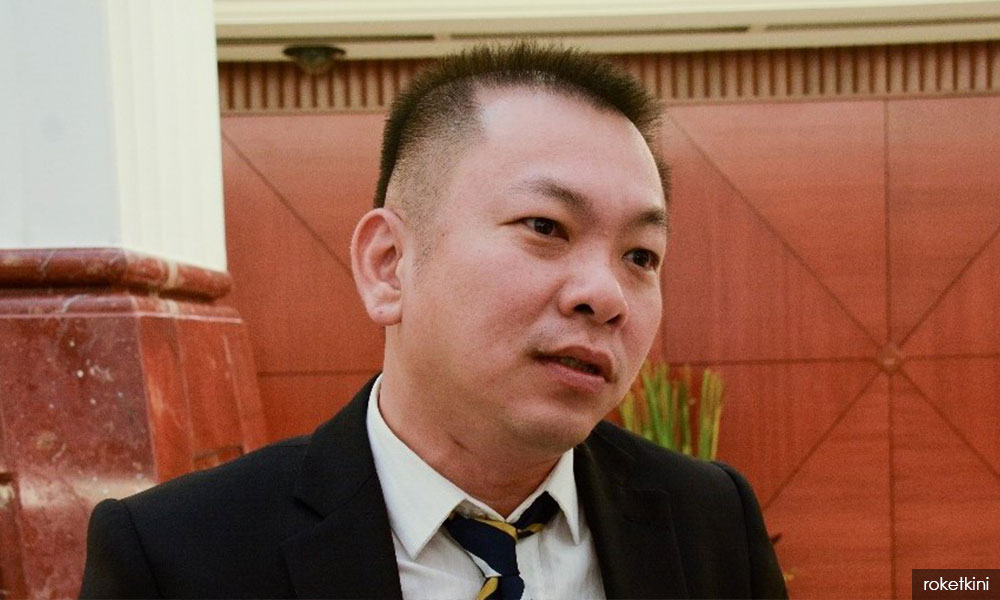
Security vs investment: Harapan MPs differ on China's interest in Sabah
Amanah's Pulai MP Salahuddin Ayub has expressed national security concerns at China's interest to invest in the oil palm industry in Sabah but DAP's Kota Kinabalu MP Chan Foong Hin said his Pakatan Harapan colleague should not be prejudiced.
Chan said Salahuddin's (above) comment was uncalled for and "unfairly cast a negative aspersion towards all investments from China".
"It was clearly made with spite and prejudice towards China. Instead of being prejudicial, Sabah should welcome foreign investors interested in coming to Sabah to bridge the economic gap between Sabah and the peninsula," said Chan.
On Wednesday, Salahuddin noted that firms from China have been buying up and leasing large swathes of land for agriculture and mining abroad.
He said a foreign country owing large swathes of land could be a national security concern, something which guided Malaysia to launch a "raid" on the London Stock Exchange in 1981 to takeover Guthrie Group Limited and return 200,000 acres of agricultural land to Malaysian control.
He also referenced examples in Sri Lanka, Tanzania and Congo which have had to surrender assets and real estate due to serious indebtedness to China.
"Sabah's strategic position in the race for influence between China and the West in the South China Sea requires us to be more cautious in evaluating investment offers from the country.
"We saw the cautiousness when Indonesia rejected China's bid to own agricultural land in their country," Salahuddin said.

Kota Kinabalu MP Chan Foong Hin
Reasonable strategic move
Salahuddin made the comment after China's foreign minister Wang Yi made a private visit to Kota Kinabalu on June 5 and expressed interest to invest in the state's oil palm industry.
Chan, however, said Wang's statement was a "reasonable strategic move to ensure China's own food security".
He said if there are sovereignty concerns, Malaysia can preempt them by ensuring rules and policies to encourage China to invest in specific fields and sectors in the palm oil industry.
"For example, China could be encouraged to invest in downstream processing industries, such as edible oil refineries, oleochemicals factories, etc. These downstream industries are exactly what Sabah lacks," said Chan.
He added that Sabah won't be taking up large debt from China like Sri Lanka, Tanzania and Congo.
"Simply put, we have to welcome all foreign investment that conforms to the Malaysian investment promotion policy, including from China.
"The conflict in the South China Sea has nothing to do with business investment - as citizens of our own country, we will definitely defend the sovereignty of our country.
"However, as far as doing business is concerned, China has a huge population consuming palm oil and actually benefits from imports of more palm oil products from Malaysia/Sabah, and it is a reasonable business decision to set up factories directly in the exporting countries," he said.
Reasonable strategic move
Salahuddin made the comment after China's foreign minister Wang Yi made a private visit to Kota Kinabalu on June 5 and expressed interest to invest in the state's oil palm industry.
Chan, however, said Wang's statement was a "reasonable strategic move to ensure China's own food security".
He said if there are sovereignty concerns, Malaysia can preempt them by ensuring rules and policies to encourage China to invest in specific fields and sectors in the palm oil industry.
"For example, China could be encouraged to invest in downstream processing industries, such as edible oil refineries, oleochemicals factories, etc. These downstream industries are exactly what Sabah lacks," said Chan.
He added that Sabah won't be taking up large debt from China like Sri Lanka, Tanzania and Congo.
"Simply put, we have to welcome all foreign investment that conforms to the Malaysian investment promotion policy, including from China.
"The conflict in the South China Sea has nothing to do with business investment - as citizens of our own country, we will definitely defend the sovereignty of our country.
"However, as far as doing business is concerned, China has a huge population consuming palm oil and actually benefits from imports of more palm oil products from Malaysia/Sabah, and it is a reasonable business decision to set up factories directly in the exporting countries," he said.
No comments:
Post a Comment